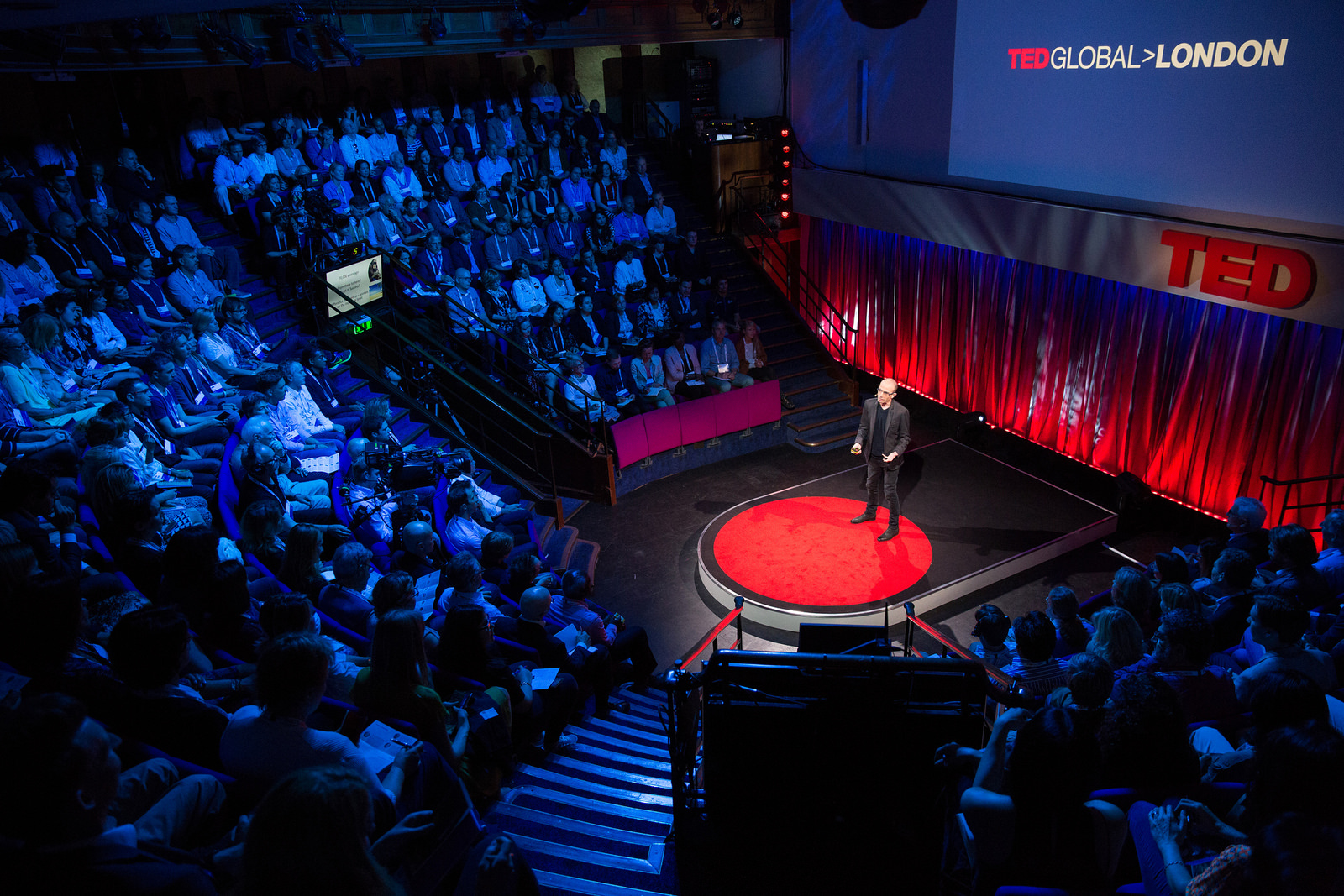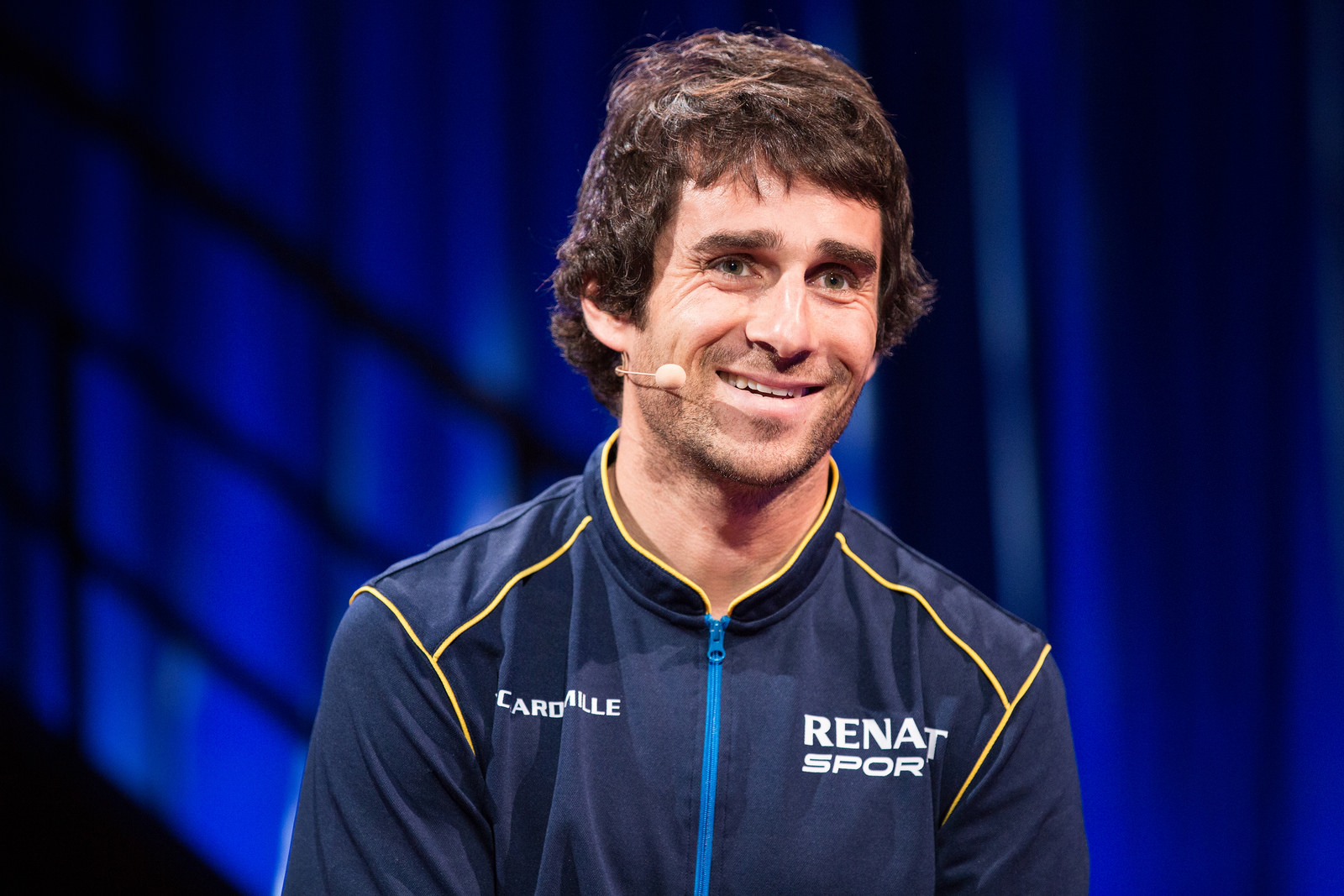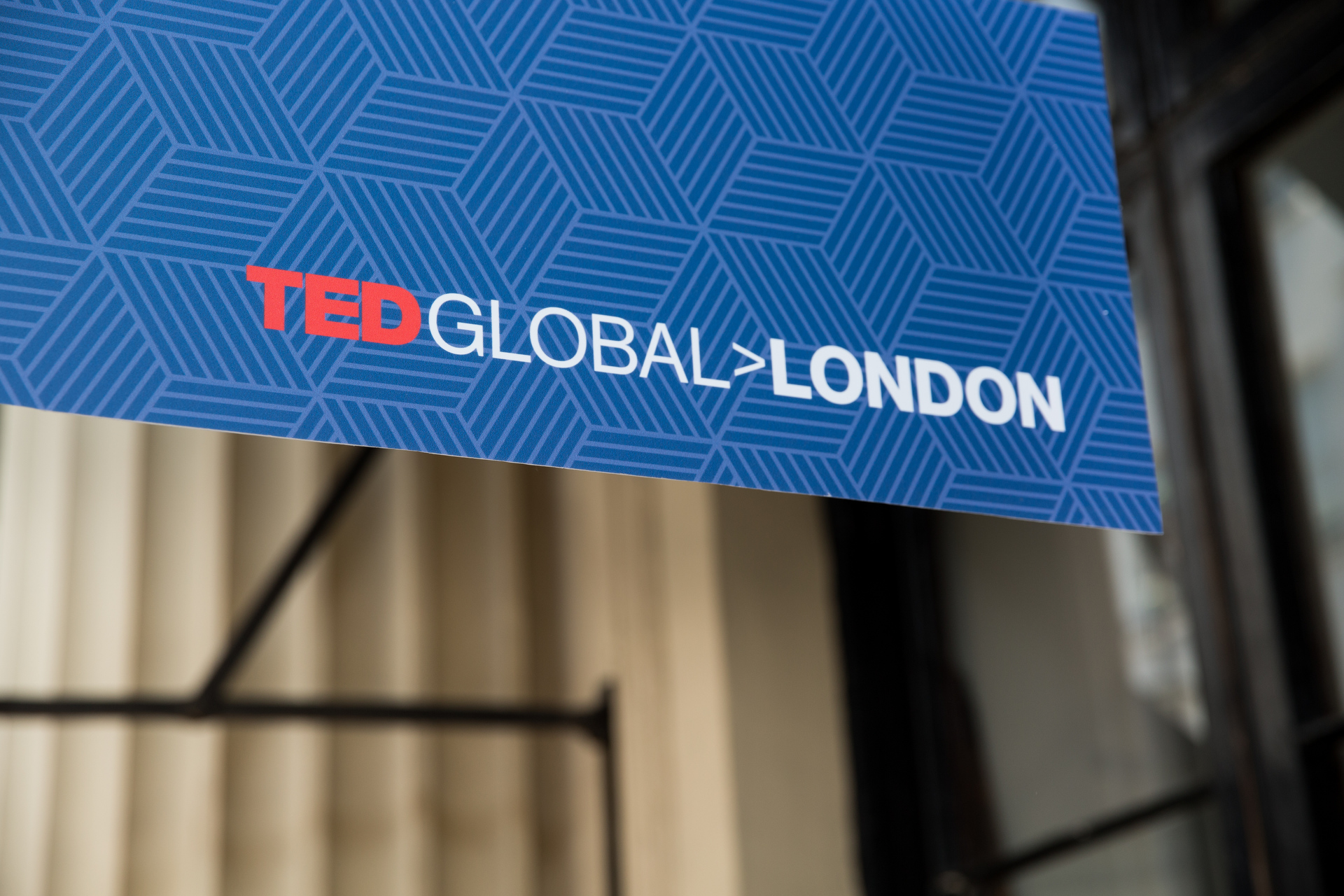
Why do humans rule the world? At TEDGlobal>London, Yuval Noah Harari says it’s our ability to imagine. Photo: James Duncan Davidson/TED
Formula E racing, the darknet, a potential fountain of youth, and beheadings. At TEDGlobal>London — a two-session event curated and hosted by Bruno Giussani on June 16, 2015, at the Royal Institution of Great Britain — the talks ranged from a wildly hopeful future to stern warnings about the present. Enjoy these recaps of the talks in the event.
In the first session…
What sets humans apart? Our ability to imagine. Prehistoric humans were just another unimportant animal — and yet, today, homo sapiens control the planet. How did we get from there to here, asks history professor Yuval Noah Harari? It turns out, it’s because we can imagine things. Nation states, religions, laws — even money — are fictions, and as long as we believe in them, we’ll continue to cooperate effectively in large groups. Think you could convince a chimp to give you a banana by promising that after he dies, he might get countless bananas in Chimpanzee Heaven? Yeah. Not so much. Only humans believe such stories. This is why we rule the world, whereas chimps are locked up in labs. Watch Yuval Harari’s TED Talk … and read more about Harari’s insights at Ideas.ted.com »
Are we really facing a 2°C warming … or worse? Alice Bows-Larkin says we’re ignoring reality when it comes to climate change — and not just on a personal level. Our policy discussions have focused on limiting global warming to 2°C above pre-industrial levels. But looking at a graph of the exponential growth of emissions, we’re really on a path toward a 4°C warming, says Bows-Larkin. And this will translate into an 8 or 10 degree temperature rise in cities. Imagine the hottest day in New York or Mumbai, and add 10 degrees to that, forever. “Our infrastructure has not been designed to cope with this,” she says. To avoid this hot new reality, we need a 10% decrease in a emissions per year — starting right now. And to get there, we might need to question which we value more: economic growth or our planet’s future. Bows-Larkin points to a 2011 paper in which she and a colleague suggested a period of “planned austerity in wealthy nations” might help us reduce emissions. It was not a popular suggestion, she says now. Watch Alice Bows-Larkin’s TED Talk >>
Severed heads as spectacle, then and now. “For the past year, we’ve all been watching the same show, and I don’t mean Game of Thrones,” says anthropologist Frances Larson — but rather, a show produced by murderers and aired on the worldwide web: the recent beheadings of seven Western men by ISIS, filmed and uploaded. “It’s easy to say they’re barbaric, but if we think that they are archaic — from a remote, obscure age — then we’re wrong,” Larson says. While the nature of beheadings and executions has changed with time, one thing hasn’t: We all watch. Beheadings of criminals by guillotine drew crowds in 1792 France; execution day was almost like a carnival. Today, although a public execution is unthinkable, our morbid fascination with severed heads continues. Modern terrorist beheadings are staged, a “horrifying real-life drama” — and a viral spectacle. While it’s easy to feel distant and passive, clicking on a video of a terrorist beheading, the act’s power comes from the people watching as the killer performs. Everyone who looks plays a part. Larson ends with a powerful observation: “We should stop watching, but we know we won’t. History tells us we won’t and the killers know it too.” Watch Frances Larson’s TED Talk >>
Society’s toll on joy. With a guitar in hand, Alice Phoebe Lou — a South African singer-songwriter now based in Berlin — begins her song “Society” with a delicate finger-picking melody. In a lullaby-like lament, she sings of a man embittered by what could have been: “Oh society, what have you done to me?” Afterward, she plays “Red,” singing in a translucent, reflective voice, this time of a man who chases money while stifling his inner joy. “He gets out of bed / money makes him poor,” she sings. “He’s been mislead / life’s flown overhead.”

Formula E racer Nicolas Prost answers questions about his electric race car — and the creativity it takes to drive it. Photo: James Duncan Davidson/TED
Do race car drivers dream of electric vehicles? Nicolas Prost competes in the Formula E competition. Formula Huh, you say? Formula E — the first all-electric race car championship. Prost, who’s currently placing fourth in the first year of the race, explains more: it’s essentially like the grandaddy racing championship, Formula One, only these cars have electric engines and rechargeable batteries. These battles are less about costly technology, though, because all the drivers have essentially the same car with the same engine. The difference is made “by engineers and drivers, not by money,” says Prost. The young Frenchman will try to emulate the success of his legendary Formula One driver father, Alain Prost, in the final race of the season — to be held in London at the end of June. Read an interview with Nicolas Prost on ideas.ted.com >>
Do we understand addiction? It’s been 100 years since the US and Britain banned drugs, says journalist Johann Hari. And he calls it a “fateful decision” to punish addicts as criminals, instead of treating addiction as an illness. Does the century-long, fairly ineffective War on Drugs have at its base a faulty assumption about what addiction is? Hari points to a few hints that addiction may be about more than building a dependency on “chemical hooks” — like the fact that when your grandmother has a hip replacement, she will get dosed, heavily, with a powerful heroin-like narcotic for pain, but she usually doesn’t become an addict afterward. Addiction might have more to do with environment, specifically with a sense of social isolation, says Hari — who has seen the ravages of addiction in his own family. For his new book, he visited Portugal, which decriminalized drug use in 2000 and dedicated its former war-in-drugs budget to creating jobs and social connection for addicts, reuniting them with a sense of purpose. The move has been widely applauded, and fifteen years on, the numbers show it works. Hari suggests, “The opposite of addiction is not sobriety. The opposite of addiction is connection.” Watch Johann Hari’s TED Talk >>
After a short break, the second session…
Social media shaming. In the early days of Twitter, “voiceless people realized that they had a voice,” says journalist Jon Ronson. “When powerful people transgressed, we realized that we could do something about it … we could hit them with a weapon that we understood and they didn’t: a social media shaming.” But lately, it seems to have gotten out of control. He tells the story of Justine Sacco, who made an ill-advised joke to her 170 Twitter followers before getting on a plane. When she got off the flight and turned on her phone, she was trending on Twitter worldwide, the subject of a (sometimes violently threatening) social media shaming campaign. In a week of online shaming, she lost her job, her reputation and her sense of self. Social media is “a mutual approval machine,” says Ronson, who spent three years interviewing people like Sacco for his new book, So You’ve Been Publicly Shamed. We’re seeing in black and white, deciding that people are either heroes or horrible, when the reality is much more gray. “We are now creating a surveillance society, where the smartest way to survive is by being voiceless,” he says. Watch Jon Ronson’s TED Talk >>
Welcome to the darknet. Jamie Bartlett studies crypto-currency, surveillance and counter-surveillance — and he’s here to talk about a place where all those fascinations meet: the darknet. Accessed using the Tor browser (first developed for the US military to ensure online privacy), the darknet contains 20,000 or 30,000 sites where, among other pursuits, you can buy weed, cocaine and illegal pornography, paying with Bitcoin … on websites that are very, very similar to mainstream shopping sites. They have search, shopping carts, click-to-buy buttons, and — most vital — user ratings. Bartlett analyzed 120,000 pieces of online consumer feedback on darknet sites, and found a very high level of consumer trust between online dealers and customers. To strengthen that trust, there’s even an escrow system, so everyone gets their money and/or product. As he says, “The creation of an anonymous marketplace which is competitive and, on the whole, functions is a remarkable, staggering achievement.” Watch Jamie Bartlett’s TED Talk >>
The digital age of conflict. “What are the connections between Facebook, Minnesota, ISIS and Al-Shabaab?” asks security analyst Rodrigo Bijou. The answer: the two terrorist groups used social media to recruit young men in Minnesota to their cause. The digital landscape has changed radicalization, says Bijou, and it’s also changed what constitutes a threat. Governments simply aren’t nimble and adaptive enough to keep up, he says. He points to a moment in the wake of the Charlie Hebdo attack when terrorists infected a “Je Sui Charlie” photo meme with malware. “The new common class of threats is decentralized, digital and takes place at network speed,” he says. So how can we stay safe? Peer-to-peer security, says Bijou. “Individuals have more power than ever before to affect national and international security,” he says. He ends with a plea for governments to nurture hackers, value encryption and support privacy. Because if governments use security backdoors to check in on their citizens, so can those with ill intent. Watch Rodrigo Bijou’s TED Talk >>
In defense of millennials. Poet Suli Breaks takes the TEDGlobal stage with a warm, confident smile, piano accompaniment behind his words as he lays out his “Millennial Generation Manifesto.” In it, he addresses common misconceptions about his age group. “They say I don’t get involved in politics, but I engage in politics on Facebook.” Even though millennials do things differently, he says, they don’t deserve all the scorn. “You keep telling us to look up from our screens / just to see you looking down on us, it seems.” Breaks wants to see different age groups collaborate. “It’s a new day, and even though we grew up in different generations / we are facing the same problems disguised as different situations.”
Of mice and (young) men. The fountain of youth may not be as far-fetched as we think, says neurologist Tony Wyss-Coray. He shares past research that shows how old mice, when given a common blood supply with a young mouse through a process called “parabiosis,” showed tissue rejuvenation in the pancreas, liver and heart. “What I am most excited [about] is that this may even apply to the brain,” he says. Wyss-Coray’s lab looked at blood samples from human beings ages 20 to 89, and found a strong correlation between chronological age (age in years) and biological age (the age of their body). And they identified multiple factors in the blood that correlated with age. But could these factors actually effect tissue? To test this, they paired young mice and old mice in parabiosis, and found that — yes — the brains of the old mice showed more active synapses and had less inflammation than before. In a second experiment, mice injected with young human plasma performed better on a memory test than ones injected with a saline solution. Anyone with a sci-fi imagination may automatically be imagining horrifying scenarios of the future — will billionaires set up ‘young person farms’? — but there’s still a long way to go to see if this can work in humans. But Wyss-Coray is going there. He is running a small clinical study in which adults with mild Alzheimer’s will receive injections of plasma from 20 year olds once a day for four week. The results could prove fascinating. Watch Tony Wyss-Coray’s TED Talk >>
Quantum … biology? Jim Al-Khalili is a quantum physicist. So as he says, “I’ve grown used to the weirdness of quantum mechanics,” the counterintuitive, two-places-at-once subatomic strangeness first described by physicists almost a century ago. Today, though, he asks whether physics is the only field that has to learn to live with quantum mechanics. Perhaps, too, the principles apply to biology. Could some of the messiness of life be explained by quantum biology? Ernest Schrödinger first suggested this in 1944, and Al-Khalili talks through some ground-breaking new papers that suggest that phenomena such as photosynthesis and possibly even bird migration may be explained by quantum physics. Life, suggests Al-Khalil, may have evolved ways to take advantage of quantum mechanics. Watch Jim Al-Khalil’s TED Talk >>
Developing an undeveloped relationship. Photographer Diana Markosian was seven years old when her mother took her away from her father. She left the Soviet Union for California — and was never given the chance to say goodbye to him. In a somber, raw and visual account, Markosian shares how she waited years for him to find her … before she found herself standing in his courtyard 15 years later. She moved in with him, but found that the space between them was much too profound. She began a photo project as a way to bridge the gap. They found it easier to take snapshots of each other than to search for words that the other could understand. “It was a way for us to be together without the past intruding,” she says.
Finally, singer-songwriter Alice Phoebe Lou returned to the stage and, in an unnamed song, told the story of a young, determined heroine who broke free to experience the world. “She cut a hole in the fence and ran,” she sang, ending the event on an uplifting note.
Check out the TEDGlobalLondon program guide.
Further reading on ideas from TEDGlobal>London on ideas.ted.com >>

TEDGlobalLondon was a one-day event held in the Faraday Lecture Hall at the Royal Institution of Great Britain. Photo: James Duncan Davidson/TED
Comments (2)